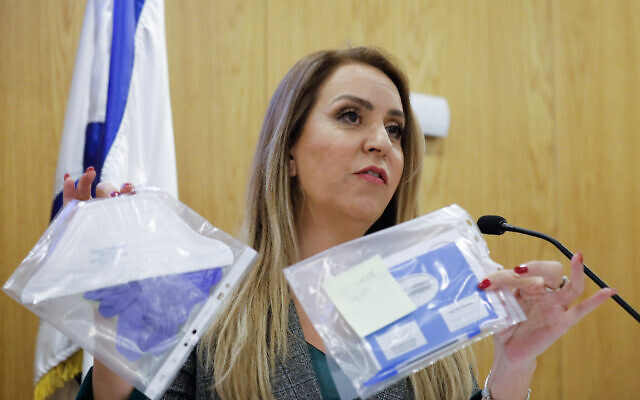Orly Adas urges public to ‘be smart enough’ not to buy into or share ‘rumors and conspiracy theories’ reminiscent of Trump campaign

The head of the Central Elections Committee warned Monday, a day before the national election, of growing efforts to delegitimize the results of the vote, predicting that some people were planning to use the expected lengthier count to cast doubt on the entire process.
“We are talking about a strategy that has been gaining ground for a while, and already began in the [September 2019] election campaign for the 22nd Knesset and faded, and then began again in the [April 2020] election for the 23rd Knesset, to delegitimize the election results,” CEC director Orly Adas said in an interview with Radio 103 FM.
She warned that coronavirus precautions combined with the upcoming Passover holiday could mean the final results of the elections will remain unknown for several days, and that some could use the delay to sow confusion and unrest.
“It can certainly be a fertile ground for disseminating all kinds of information detached from reality,” Adas said.
The main reason for the likely delay in final results is the increase in numbers of the so-called double envelope ballots, which are not counted at the voting sites but are brought to CEC headquarters in the Knesset to be counted after the regular ballots.

In normal years these include the votes of soldiers, medical staff and patients in hospitals, prisoners and disabled people, as well as diplomats abroad who vote earlier than the rest of the population. However, this year they also include the ballots of people infected with coronavirus, those in quarantine, and residents of nursing homes.
According to the Ynet news site, the number of double envelopes is expected to increase from some 330,000 in the previous elections to between 500,000 and 600,000 this time, or the equivalent of 15 seats in the 120-seat Knesset.
With several parties currently hovering around the 3.25 percent electoral threshold, this could lead to radical shifts in the eventual result.
Adas urged patience and said she hoped the public would “be smart enough” not to buy into or share “rumors and conspiracy theories” as the count continues.

“But worse, in recent times it has been not [only] the public [sharing such rumors] but incumbents and even those on the committee and the committee itself,” she added.
On Sunday, Knesset Speaker Yariv Levin, attacked the Central Elections Committee as “biased” and its decisions as “illogical.”
“The decisions by the committee head, Justice [Uzi] Vogelman, are biased, one-sided and completely illogical,” Levin said to the Kan public broadcaster, giving as an example the recent decision to bar from TV broadcast a stand-up comedy sketch by Netanyahu that was deemed election propaganda.

Asked if Likud would accept any election result, Levin said: “We have always accepted the voters’ will, and we will continue to do that.”
Adas, speaking Monday, said she found Levin’s comments “shocking,” stressing that the committee “only operates within the boundaries of the provisions of the law, and Levin knows this.”
Asked if she saw a parallel to the efforts of the Trump campaign to delegitimize the US election, Adas said, “I want to believe that we are different from the Trump campaign and that we have better things to learn from the United States rather than these terrible things.”
Netanyahu on Thursday promised to accept the election results, even if he loses. “Of course I’ll accept the results. What can I do, cry?” he told Army Radio.

The election — the fourth in two years — was called after the power-sharing government of Likud and Blue and White failed to agree on a budget by a December 23 deadline. The election, like the previous three votes, is largely seen as a referendum on Netanyahu’s rule, given his ongoing trial on corruption charges, as well as his government’s handling of the COVID-19 pandemic.
As reported by The Times of Israel
